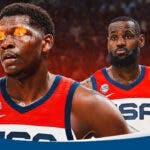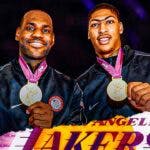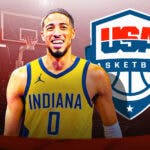Is Team USA headed for a basketball disaster at the Olympics, akin to 2004 and 1988? It's too early to say, and we should certainly note that in exhibition games, it's reasonable for NBA athletes to not spill the tank. They could flip the switch, and everything could be fine.
However, everyone associated with Team USA has to admit that after a loss to Nigeria, Monday's game against Australia was supposed to go differently… and it didn't. The Americans lost to Australia to fall to 0-2 in warm-ups before the Olympics.
The Americans were supposed to be roaring mad against the Aussies, furious that they actually let a game slip away. Monday's game did not bring forth the best in Team USA. The pride, the competitive edge, the insistence on not losing? They weren't evident, at least not throughout the roster. Damian Lillard played well. Bradley Beal was solid. After that? This performance simply didn't meet basic standards.
Exhibition or not, Team USA expects to play its best in global basketball events. One hiccup? That happens. Two straight losses? That's not the winning culture which has existed the past 13 years.
Historians of Team USA Basketball know that after the loss to the Soviet Union in the 1988 Seoul Olympics, the long-term practice of sending amateurs (collegians) to the Olympics had to give way to the pros. That loss in 1988 was less about culture and more about running up against the reality that other nations' professionals were better than America's college kids.
The 2004 Athens Olympics were different. Team USA played selfish and individualistic basketball, so much that Larry Brown — who preaches team-first ball and had just won the NBA title with the Detroit Pistons — couldn't get his Olympic roster to buy what he was selling. That 2004 team bickered and squabbled and never played with cohesion or joy. Argentina and a man named Manu Ginobili won the gold at those Olympics, playing the fluid team game Brown failed to coax out of his players.
Team USA Basketball knew it had to get its athletes on the same page. In came Mike Krzyzewski to not necessarily run a tighter ship, but to work on building relationships with players so that when the time came to shine, everyone on the American bench would trust the coach, trust teammates, and trust the plan for victory.
In 2008 in Beijing, the Americans won gold at the Olympics. They did so again in 2012 in London and in 2016 in Rio. Coach K might as well have been named Coach Gold. Team USA had restored itself.
This brings us back to the present moment. Many will say that Gregg Popovich, based on these two losses, is not the right fit for the team. That's hogwash. Popovich is — much like Larry Brown (the two men are good friends) — a demanding coach who insists on team play. He ought to be an ideal fit for Team USA… but we're clearly not seeing players on the same page.
Yet, this is not a repeat of 2004 in all its specific details. Yes, this is a less-than-ideal roster — that is a salient and central comparison with the Athens Olympics 17 years ago — but the starting five on this team has accomplished a lot more than the 2004 starting five did. The 2004 Team USA starting lineup had Tim Duncan and Allen Iverson, but it also had Stephon Marbury, Richard Jefferson, and Lamar Odom. Yikes.
Mike Bibby, Jason Kidd, and Tracy McGrady — three clearly better players than Marbury-Jefferson-Odom — didn't play in those 2004 Olympics for Team USA. Roster construction was a real problem.
This gets to the real reason Team USA should be concerned heading into the Tokyo Olympics: The circumstances surrounding these Games simply do not lend themselves to America bringing its best players or its highest level of play.
LeBron James is physically wiped out. He needs the summer off to regroup for a title run with the Lakers next year. Steph Curry is in a similar spot with the Warriors. Many players better than the ones on this roster are staying home.
Is it the compressed schedule which did this? Does the short NBA offseason explain the lack of a complete Team USA roster? Are players emotionally exhausted? Does the fact that the Olympics occur during the NBA draft (July 29) and free agency (beginning on Aug. 2) mean that players are distracted, since their futures could be determined while they are in Japan?
It's hard to answer each of those questions individually… but collectively, they all show that this Olympic venture for Team USA comes at a point in time when distractions for players are numerous and substantial. Players are not in a position to perform with supreme clarity and focus.
A pandemic season brought unique challenges. The NBA calendar has been thrown out of whack. Yes, most players on this roster have had ample time to rest since the end of the regular season, but gearing back up for the Olympics is a real emotional challenge for Team USA, and it is not something to take lightly. Any coach — including Coach K — would have a tough time balancing the need for a gentle touch with a fiery motivational style in this situation.
Also keep in mind that the best player on this roster — Kevin Durant — is the one player who went relatively deep in the playoffs. Durant, more than anyone else on this team, is not physically or mentally fresh. It matters when a roster's best player is also the most worn out.
The biggest problem with Team USA heading into the Olympics is that the overall situation is set up for failure: Whether it is scheduling; pandemic challenges and disruptions; roster opt-outs from elite players such as Steph and LeBron, leaving the team with little depth and a mediocre bench; Durant being worn down; or NBA free agency being on players' minds during the Olympics, this is a minefield of distractions which didn't exist at previous Olympics with NBA players. This nasty battlefield won't exist in 2024 or other future Summer Games.
This is more of a roster problem than a coaching problem, and it is more of a scheduling problem than a talent development problem, if you had to evaluate specific problems on an adjusted scale. Yet, those distinctions are secondary to the bigger issue. This is a problem which is less about one issue and more about the full collection of circumstances. Several different forces are at work, and they are all flowing against Team USA.
Maybe this team will flip the switch in Tokyo — that is always a possibility with Kevin Durant on the floor — but no one should be counting on that right now.




